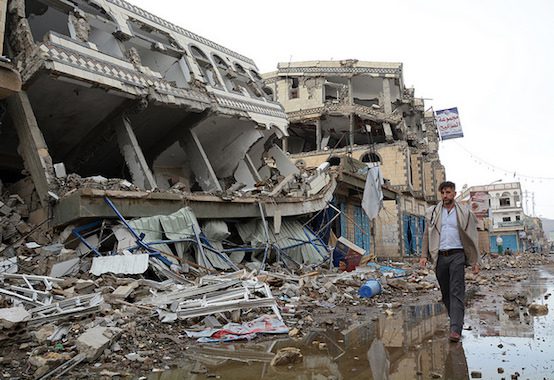Saudi Lies and the War on Yemen

This exchange between an interviewer for NPR’s Morning Edition and a spokesman for Saudi Arabia makes for depressing reading:
ASIRI: Unfortunately, today, there is no team from Human Rights Watch on the ground.
KELLY: They went. They saw it.
ASIRI: No. No one can get in Yemen without the permission of the coalition. So we don’t have single permission from the United Nations on the ground.
We hope that Human Rights Watch and the other NGOs come to the coalition and ask permission and we will send them down to investigate. We need to investigate those allegations [bold mine-DL]. You cannot…
KELLY: I think you and Human Rights Watch are going to agree to disagree. My question is whether the Saudi intervention has improved things. The country remains in chaos after more than a year of fighting. Are you any closer to your goals or bringing stability to the country?
In fact, Human Rights Watch is one of several organizations that documented likely war crimes carried out by the Saudi-led coalition in Yemen. It is true that the Saudis make it very difficult for outside groups and journalists to gain access to the country because they don’t want this to be known, and they deliberately stymied an independent investigation into war crimes in Yemen at the U.N. with U.S. and allied acquiescence. Nonetheless, HRW and others have investigated the effects of the coalition’s indiscriminate bombing campaign along with the crimes committed by all parties to the conflict. They have ample proof that the Saudi-led coalition has carried out numerous strikes on civilian areas in violation of international law. They have also said that the coalition may be guilty of crimes against humanity because of the pattern of targeting civilian areas. Kenneth Roth, the executive director of Human Rights Watch, reacted to the coalition spokesman’s claims:
Saudis can’t defend killing Yemeni civilians so pretend @HRW wasn’t there to investigate. https://t.co/w3BuOSx4NM pic.twitter.com/4vvC4Df1vS
— Kenneth Roth (@KenRoth) May 16, 2016
The Saudis have moved from brazenly denying that civilians were killed by their attacks to feigning concern for the victims, but it doesn’t change that they have been working overtime to avoid accountability for their crimes over the last year. Unfortunately, they were able to use this interview to do the same thing.
The other troubling thing about this interview is that the Saudi spokesman isn’t pressed on any of his statements, and he is asked the softest, least challenging questions imaginable under the circumstances. When he claims that his government views Yemenis as neighbors, an appropriate response might have been: “So why have you been starving your neighbors with a blockade for the last thirteen months?” Regrettably, the coalition’s blockade and its effects are never mentioned in the interview. The interviewer also asks whether the “Saudi intervention has improved things,” but that is the wrong question to ask. The spokesman should have been forced to defend the enormous harm that the intervention has plainly done and the yawning gap between the coalition’s stated goals and what it has done. The interviewer mentions that thousands of those killed since last March have been civilians, but neglects to inform the audience that most of these have been killed by coalition bombs.
The war on Yemen gets very little coverage, and I don’t expect one interview to be able to remedy that problem. I understand that there is only so much time that is going to be dedicated to covering this story, but that makes it all the more important that the spokesman for the Saudi-led coalition is presented with questions that will cut to the heart of the story as quickly as possible. The Saudi spokesman was able to get away with lying to NPR’s audience, and there was little or no attempt to call him on it.
Comments